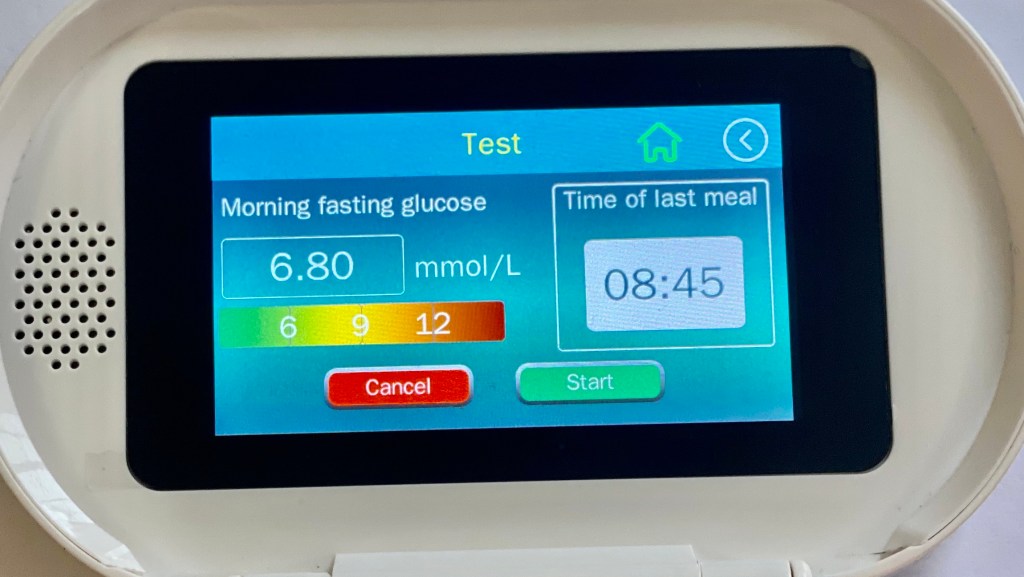If you have diabetes, or ever suspected that you might, you will have done the poke-your-finger-and-drop-blood-on-a-stick thing until your finger goes numb. Finger-prick blood glucose monitoring is the de facto standard, but AI company Scanbo wants to put an end to all that, replacing the droplet with some off-the-shelf diagnostic tools and a big helping of data analysis.
The company has developed a prototype device that combines a three-lead ECG measurement and a Photoplethysmogram (PPG). The 60-second measurement is fed to a set of algorithms that can give you some very promising measurements. For starters, the device is doing non-invasive blood glucose monitoring, but the company’s founder claims that it can also do blood pressure measurements.
I spoke to the company’s founder and CEO, Ashissh Raichura, as part of TechCrunch’s virtual CES coverage, where he told me a bit more about the technology. He also gave me a demonstration, first testing his own blood with a conventional, off-the-shelf fingerprick blood glucose monitor, and then with the company’s own prototype. The measurements were 6.2 and 6.3 mmol/L, respectively, which puts the two devices within a couple of percent accuracy of each other.
“We use the three electrodes for ECG data, and an additional measurement for PPG. We measure for 60 seconds, and then take the raw data and analyze that using the machine learning convolutional neural network, and the deep neural network. We combine all of that data, take the three machine learning algorithms, see what comes as a result, and then analyze the glucose,” Raichura told me, as he was preparing to demo the device for me. “We want to commercialize our product, and will be looking looking for US FDA in Health Canada approval.”

I was surprised to learn that it is possible to do non-invasive blood glucose measuring — most of the so-called non-invasive methods do use an implant or a filament sensor wire to get readings, but the method that Scanbo uses has been studied and covered in medical journals. It doesn’t look like the FDA has approved any products that take this approach yet, so the company is certainly facing a lengthy medical approval process in order to bring its products to market.
The company also claims it is able to do blood pressure measurements, the kind that you might do at home or in the doctor’s office with a blood pressure cuff.
“When we take your EKG data, we convert that into what is called a short wave transmission length,” Raichura summarizes in how the company is able to pull off blood pressure metrics. “Based on that, we calculate your non-invasive cuff-less blood pressure too. That is another piece of algorithm that we have patent pending.”
With all of this tech in its back pocket, the company has an interesting choice to make; is it going to start manufacturing its own hardware devices, or is there an opportunity to license the algorithms and technology to other manufacturers that already have devices with PPG and ECG capabilities on the market.
“We have two patents pending, purely on the hardware, how we designed it, how we amalgamated electrodes and all the sensors in a way where we can take all the parameters in one time,” explains Raichura, hinting at how the company is trying to measure all the things at once. “If you look at the traditionally available all the devices, you measure one thing at a time, not everything at once. You do blood pressure one time, your EKG at another time. One after another, all in sequential processes. In our case, we are asking you to put four fingers on the device, so we can capture all the data, and use algorithms to report different aspects of your health.”
Scanbo sees its technology as an at-home alternative to some of the currently existing clinical techniques and technology.
“As a company, we are a combination of AI and med-tech,” Raichura says, and mentions that the market is starting to take notice. “With this product, we are just getting started now. Medtronic, Samsung, LG, and others are already talking to us and see can we collaborate with them, and we are exploring a couple of strategic partnerships that could help us in taking us to different markets globally. We see the needs from 400 million people in the world with type two diabetes, and most of the populations can’t afford glucometers — never mind continuous glucose meters. We are very, very cost-effective, and we can bring the cost down to as low as $20 a month. There is no biowaste, you don’t need any disposables, you don’t need strips or anything, just purely the machine learning algorithm and a device with a chargeable battery.”
The company is about to take its prototype and clinical results as leverage to go raise a seed round and kick off the process toward regulatory approval and, eventually, make a product available to the public.
































Comment